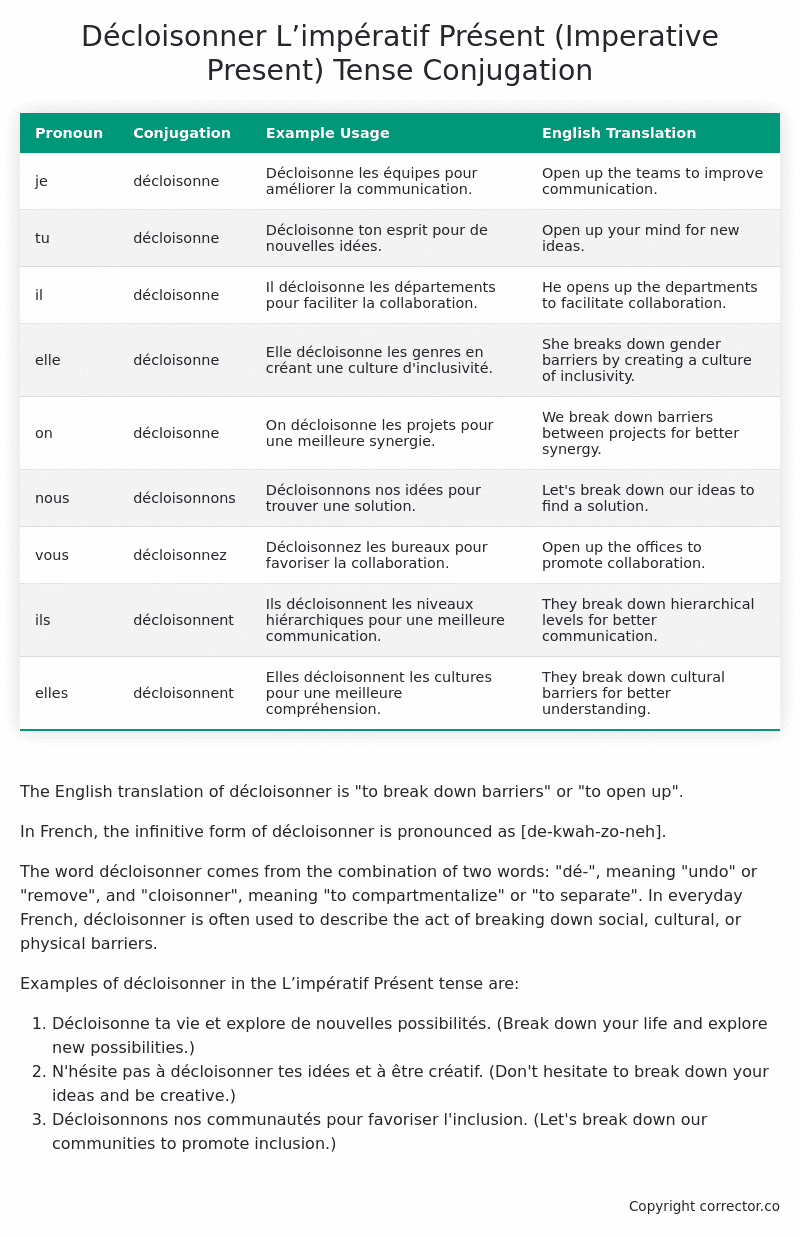L’impératif Présent (Imperative Present) Tense Conjugation of the French Verb décloisonner
Introduction to the verb décloisonner
The English translation of décloisonner is “to break down barriers” or “to open up”.
In French, the infinitive form of décloisonner is pronounced as [de-kwah-zo-neh].
The word décloisonner comes from the combination of two words: “dé-“, meaning “undo” or “remove”, and “cloisonner”, meaning “to compartmentalize” or “to separate”. In everyday French, décloisonner is often used to describe the act of breaking down social, cultural, or physical barriers.
Examples of décloisonner in the L’impératif Présent tense are:
- Décloisonne ta vie et explore de nouvelles possibilités. (Break down your life and explore new possibilities.)
- N’hésite pas à décloisonner tes idées et à être créatif. (Don’t hesitate to break down your ideas and be creative.)
- Décloisonnons nos communautés pour favoriser l’inclusion. (Let’s break down our communities to promote inclusion.)
Table of the L’impératif Présent (Imperative Present) Tense Conjugation of décloisonner
| Pronoun | Conjugation | Example Usage | English Translation |
|---|---|---|---|
| je | décloisonne | Décloisonne les équipes pour améliorer la communication. | Open up the teams to improve communication. |
| tu | décloisonne | Décloisonne ton esprit pour de nouvelles idées. | Open up your mind for new ideas. |
| il | décloisonne | Il décloisonne les départements pour faciliter la collaboration. | He opens up the departments to facilitate collaboration. |
| elle | décloisonne | Elle décloisonne les genres en créant une culture d’inclusivité. | She breaks down gender barriers by creating a culture of inclusivity. |
| on | décloisonne | On décloisonne les projets pour une meilleure synergie. | We break down barriers between projects for better synergy. |
| nous | décloisonnons | Décloisonnons nos idées pour trouver une solution. | Let’s break down our ideas to find a solution. |
| vous | décloisonnez | Décloisonnez les bureaux pour favoriser la collaboration. | Open up the offices to promote collaboration. |
| ils | décloisonnent | Ils décloisonnent les niveaux hiérarchiques pour une meilleure communication. | They break down hierarchical levels for better communication. |
| elles | décloisonnent | Elles décloisonnent les cultures pour une meilleure compréhension. | They break down cultural barriers for better understanding. |
Other Conjugations for Décloisonner.
Le Present (Present Tense) Conjugation of the French Verb décloisonner
Imparfait (Imperfect) Tense Conjugation of the French Verb décloisonner
Passé Simple (Simple Past) Tense Conjugation of the French Verb décloisonner
Passé Composé (Present Perfect) Tense Conjugation of the French Verb décloisonner
Futur Simple (Simple Future) Tense Conjugation of the French Verb décloisonner
Futur Proche (Near Future) Tense Conjugation of the French Verb décloisonner
Plus-que-parfait (Pluperfect) Tense Conjugation of the French Verb décloisonner
Passé Antérieur (Past Anterior) Tense Conjugation of the French Verb décloisonner
Futur Antérieur (Future Anterior) Tense Conjugation of the French Verb décloisonner
Subjonctif Présent (Subjunctive Present) Tense Conjugation of the French Verb décloisonner
Subjonctif Passé (Subjunctive Past) Tense Conjugation of the French Verb décloisonner
Subjonctif Imparfait (Subjunctive Imperfect) Tense Conjugation of the French Verb décloisonner
Conditionnel Présent (Conditional Present) Tense Conjugation of the French Verb décloisonner
Conditionnel Passé (Conditional Past) Tense Conjugation of the French Verb décloisonner
L’impératif Présent (Imperative Present) Tense Conjugation of the French Verb décloisonner (this article)
L’infinitif Présent (Infinitive Present) Tense Conjugation of the French Verb décloisonner
Struggling with French verbs or the language in general? Why not use our free French Grammar Checker – no registration required!
Get a FREE Download Study Sheet of this Conjugation 🔥
Simply right click the image below, click “save image” and get your free reference for the décloisonner L’impératif Présent tense conjugation!

Décloisonner – About the French L’impératif Présent (Imperative Present) Tense
Usage
Giving commands
Making requests
Offering advice
Expressing desires
Conjugation Formation
Interactions with other tenses
Want More?
I hope you enjoyed this article on the verb décloisonner. Still in a learning mood? Check out another TOTALLY random French verb conjugation!


